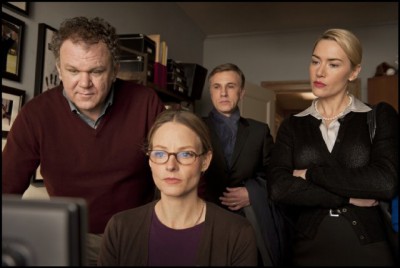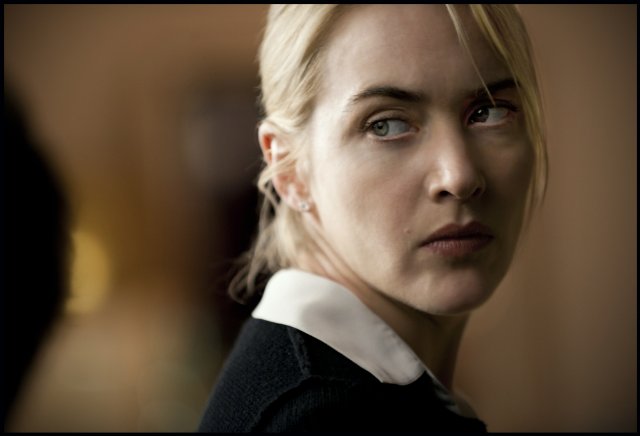“Carnage” — a Film Review by Gary Chew
Occasionally a play is good enough that it will eek itself into a motion picture. Since plays are rather static, it’s common that when they’re made for cinema, people who seldom go to the Theater complain about the movie being different from most other films they see.
That can be said of Roman Polanski’s new film, “Carnage.” As a play, it won the 2009 Best Play Tony. On stage it was known as “Le Dieu du Carnage” (“God of Carnage”), written by Yasmina Reza, the Paris-born Jewish playwright/actress/screenwriter of Iranian/Hungarian parentage. Ms. Reza and Polanski wrote the screenplay.
The first 10 minutes of the picture had almost put me in a snit for what looked to be a slow-rolling ninety minutes or so to come, when, all of a sudden, it didn’t matter it was a movie of a play I was seeing. As Leon Russell once wrote in his best song, “… the words got in the way.”

Well actually, it was the dialogue.
And it was Jody Foster, Kate Winslet, Christoph Waltz and John C. Reilly up there being the only characters in this work that speaks volumes about the real possibility that many contemporary people are determined to be so terribly“civilized” that they’re savage.
I knew that what we had here at the neat, old Tower movie house at Land Park and Broadway in Sacramento was the Theater — at work. I settled in.
Who’s afraid of a little carnage when it takes place in a nicely appointed middle-class apartment overlooking the big city, I ask. There live Mr. and Mrs. Longstreet (Foster plays Penelope; Reilly is Michael). Visiting the Longstreets for the first time (they’ve never met) are Mr. and Mrs. Cowan (Winslet is Nancy; Waltz is Alan).
Penelope, or Penny, is into art and saving Darfur. Michael sells products for the home. He’s done well. Penny is sort of liberal and wannabe art patroness, working part time in a bookstore. She’s even co-authored a book herself. And it comes out later, after a few scotches, that Michael might listen to right wing talk radio when no one’s around. But he’s nice guy.
A little higher-up the money chain, Nancy doesn’t work, and Alan is an attorney who is called on his cell every 3 or 4 minutes regarding a legal matter connected with one of his clients (a pharmaceutical firm) and the sale of a particular medicine that could be dangerous to the health of a patient using it.
What brought on this afternoon chat at the Longstreet’s is that their son, Zachary, has been smacked in the face with a stick by the Cowan’s son, Ethan. It happened in the schoolyard. And Zac sustained incisor damage. Otherwise, he’s good to go.
The Longstreets and the Cowans are rational human beings, living urbane, responsible lives. Each of them only wants to do the right thing. How could anything go wrong?
Stuff starts going wrong about 10 minutes in, just when I was trying to pull myself out of the snit about this being a sluggish, static stage play put to film.
This brings me to a point I like to make, now and then: dude, it’s the story that’s important…then the “cinemagic” or the great film director/auteur stuff follows right behind it. Some movie experts tend to forget that. Taking one more shot at this point: Have you ever seen a really visually astounding film that’s well-directed in the many ways it takes, but has a script that sucks? I have.
Digression finished: “Carnage” really gets terribly ugly and you get to laugh much of the way. Nancy barfs on expensive art books. Alan’s cell gets thrown in the bowl of water, just under the real tulips. In the living room, Penny gets agressively physical — in a non-amorous way — with her husband. And Michael gets out his 17-year-old-scotch for everybody in this party of four. As stated earlier, he is a nice guy.
All it is…is…just really great actors, really getting into some really juicy roles…and probably having a ball while on the shoot that was done in Paris yet, through the windows, looks like New York. And don’t forget the really fine music, at the top and bottom of the film, composed by Alexandre Desplat.
My only criticism is that the role of Alan should have been played with a little less snark. The words Alan speaks do the talking. And the script is a little limp keeping the Cowans there so long for the melée. (Maybe a storm, outside, could have kept them there.) I think I would’ve walked out of the Longstreet digs about ten minutes after being let in — unless, of course, Liz and Dick had been the couple who’d asked me over.
Mr. Albee, your cell phone is buzzing.

- Trump Pardons Judas Iscariot - April 23, 2025
- MAGA Emergency Kit – Act Now Before Sanity Is Restored! - April 16, 2025
- ‘FOMP’ – a Fantastic New Word - April 15, 2025


